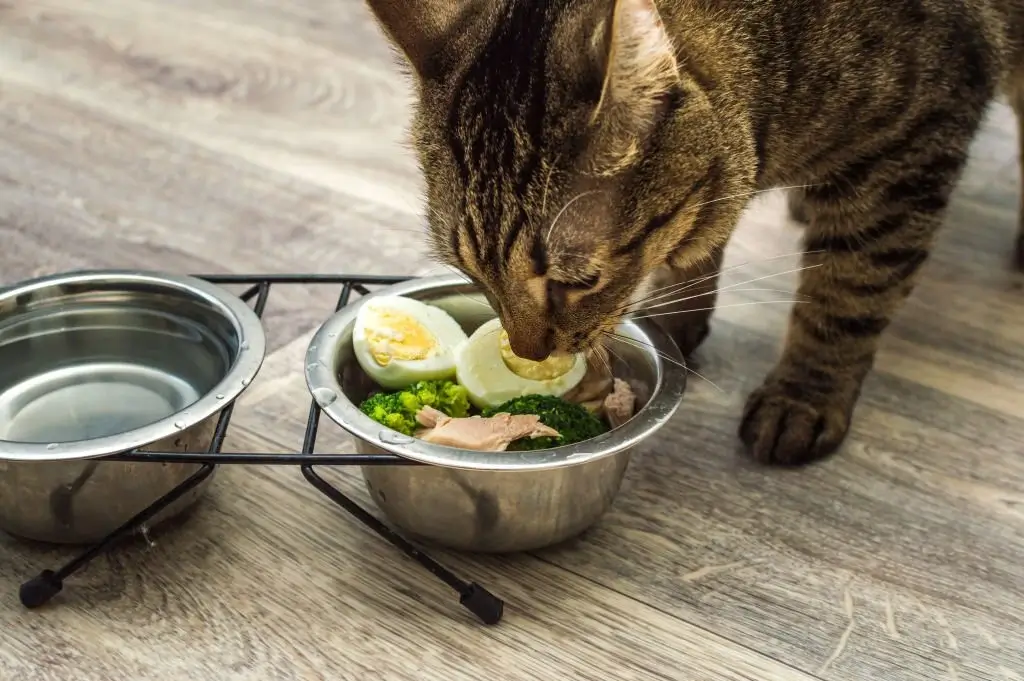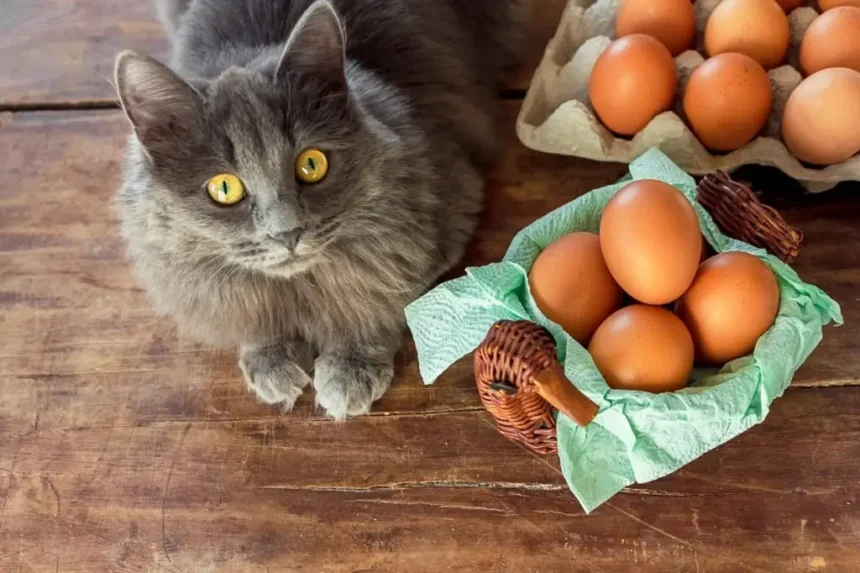Cats are known for their picky eating habits, and it can be challenging for cat owners to find the right balance of nutrients for their feline friends. Eggs are a popular human food that many cat owners wonder if it’s safe for their pets to eat. In this article, we will explore the benefits and potential risks of feeding eggs to cats and provide some tips for incorporating this nutritious food into your cat’s diet.
Can Cats Eat Eggs?
Yes, cats can eat eggs, and in fact, eggs are a great source of protein and other nutrients that cats need to stay healthy. Eggs are a complete protein, which means they contain all of the essential amino acids that cats require in their diet. Eggs also contain healthy fats, vitamins, and minerals that are essential for maintaining optimal health in cats.
Benefits of Feeding Eggs to Cats
Eggs are a great source of protein, which is essential for building and repairing tissues in the body. Protein is especially important for cats, as they require a higher percentage of protein in their diet than dogs or humans. Feeding eggs to cats can also help to promote healthy skin and fur, as well as boost their immune system.
Eggs are also a good source of vitamin D, which is essential for cats to absorb and utilize calcium. Calcium is important for strong bones and teeth, and vitamin D helps to ensure that cats can properly absorb this essential mineral. Vitamin D also helps to regulate the immune system and can help prevent certain types of cancer.
In addition to protein and vitamin D, eggs are also rich in other vitamins and minerals that are important for cat health. These include vitamin A, vitamin E, vitamin B12, and folate, as well as minerals like iron, selenium, and phosphorus.
Risks of Feeding Eggs to Cats
While eggs are generally safe for cats to eat, there are some risks that cat owners should be aware of. The first risk is the potential for salmonella contamination. Salmonella is a type of bacteria that can cause food poisoning in both cats and humans. It’s important to make sure that eggs are cooked thoroughly before feeding them to cats to reduce the risk of salmonella.
Another potential risk of feeding eggs to cats is the risk of an allergic reaction. Some cats may be allergic to eggs, and feeding them this food can cause symptoms like vomiting, diarrhea, and skin irritation. If your cat has never eaten eggs before, it’s a good idea to introduce them slowly and watch for any signs of an allergic reaction.
Eggs are also high in fat, which can be a concern for some cats. Cats that are overweight or prone to weight gain may need to limit their intake of high-fat foods like eggs to prevent obesity and other health problems.
How to Feed Eggs to Cats

If you’re interested in feeding eggs to your cat, there are a few things to keep in mind. First, it’s important to cook the eggs thoroughly to reduce the risk of salmonella. Raw eggs should never be fed to cats, as they can contain harmful bacteria that can make your cat sick.
One easy way to incorporate eggs into your cat’s diet is to mix them into their regular food. You can scramble an egg and mix it with your cat’s kibble, or you can boil an egg and chop it up into small pieces to sprinkle over their food. Another option is to make homemade cat food that includes eggs as a source of protein.
It’s important to remember that eggs should be fed in moderation as part of a balanced diet. While they are a nutritious food, too much of any one food can upset your cat’s digestive system and lead to health problems. Your cat’s diet should be based on their individual needs and preferences, and you should consult with your veterinarian before making any changes to their diet.
Can Cats Eat Scrambled Eggs
Yes, cats can eat scrambled eggs as long as they are cooked thoroughly and without any added ingredients that can be harmful to them. Scrambled eggs can be a healthy and tasty addition to your cat’s diet when fed in moderation.
However, it’s important to keep in mind that cats have different dietary requirements than humans and should not be fed large amounts of scrambled eggs or other human foods on a regular basis. Eggs should be considered a treat and should not replace your cat’s regular diet of high-quality cat food.
If you’re feeding your cat scrambled eggs, it’s best to avoid adding any seasonings or other ingredients like salt, pepper, or butter that can be harmful to cats in large amounts. Stick to plain scrambled eggs that are cooked thoroughly to ensure that they are safe for your cat to eat.
Additionally, it’s important to remember that some cats may be allergic to eggs, so it’s a good idea to introduce them slowly and watch for any signs of an allergic reaction. If your cat has never eaten scrambled eggs before, start with a small amount and monitor them closely for any symptoms like vomiting, diarrhea, or skin irritation.
Overall, scrambled eggs can be a healthy and tasty treat for cats when fed in moderation and prepared correctly. If you have any concerns about feeding eggs to your cat or are unsure if it’s appropriate for their individual needs, consult with your veterinarian for guidance.
FAQ’s
Here are some common FAQs about cats and eggs, along with their answers:
Can cats eat raw eggs?
No, cats should not eat raw eggs as they can contain harmful bacteria like salmonella that can make your cat sick. It’s important to cook eggs thoroughly before feeding them to your cat.
Can cats eat eggshells?
While cats can technically eat eggshells, it’s not recommended as they can be difficult to digest and may cause gastrointestinal upset. If you want to provide your cat with additional calcium, it’s best to do so through a calcium supplement or other dietary sources.
Can cats eat egg yolks and egg whites separately?
Yes, cats can eat both egg yolks and egg whites, and both are nutritious for cats. However, it’s important to cook the egg thoroughly before separating the yolk and the white to reduce the risk of salmonella contamination.
How often can I feed my cat eggs?
Eggs can be fed to cats as an occasional treat or as part of a balanced diet. However, it’s important to feed eggs in moderation to prevent obesity and other health problems. Consult with your veterinarian to determine the appropriate amount of eggs to feed your cat based on their individual needs and dietary requirements.
Can feeding my cat eggs cause allergies?
Some cats may be allergic to eggs, and feeding them this food can cause symptoms like vomiting, diarrhea, and skin irritation. If your cat has never eaten eggs before, it’s a good idea to introduce them slowly and watch for any signs of an allergic reaction. If your cat has a known food allergy, it’s best to avoid feeding them eggs altogether.
Can eggs replace cat food?
No, eggs should not be used as a replacement for cat food. While eggs are a nutritious food, they do not contain all of the essential nutrients that cats need to stay healthy. It’s important to provide your cat with a balanced and complete diet that meets all of their nutritional needs.
Conclusion
In conclusion, eggs are a great source of nutrition for cats and can be a healthy addition to their diet when fed in moderation. They are a good source of protein, vitamins, and minerals that cats need to stay healthy, and they can help promote healthy skin and fur and boost the immune system. However, it’s important to remember that eggs should be cooked thoroughly to reduce the risk of salmonella contamination, and they should be fed in moderation to prevent obesity and other health problems.
If you’re interested in feeding eggs to your cat, it’s a good idea to consult with your veterinarian first to ensure that it’s appropriate for your cat’s individual needs and dietary requirements. They can help you determine the appropriate amount of eggs to feed your cat and provide guidance on how to safely incorporate this nutritious food into their diet.
Overall, with proper precautions and moderation, eggs can be a healthy and tasty addition to your cat’s diet. By providing your cat with a balanced and nutritious diet, you can help ensure that they live a long and healthy life.



